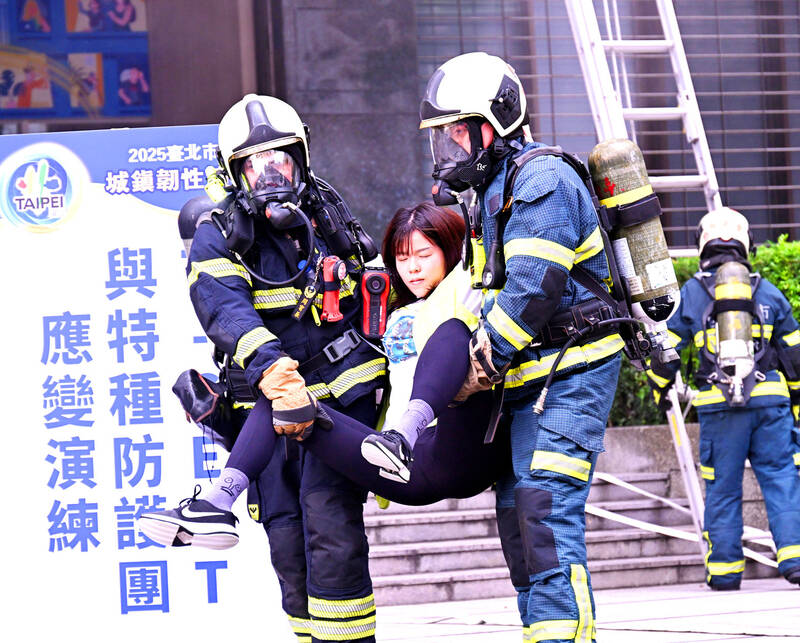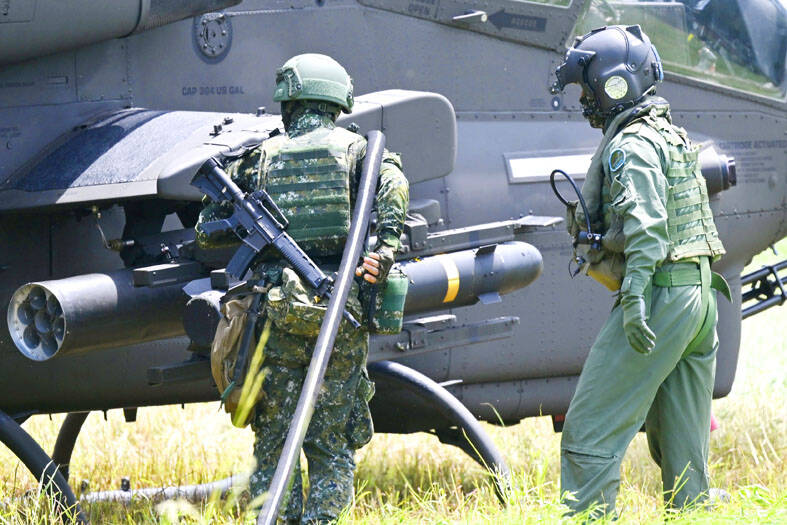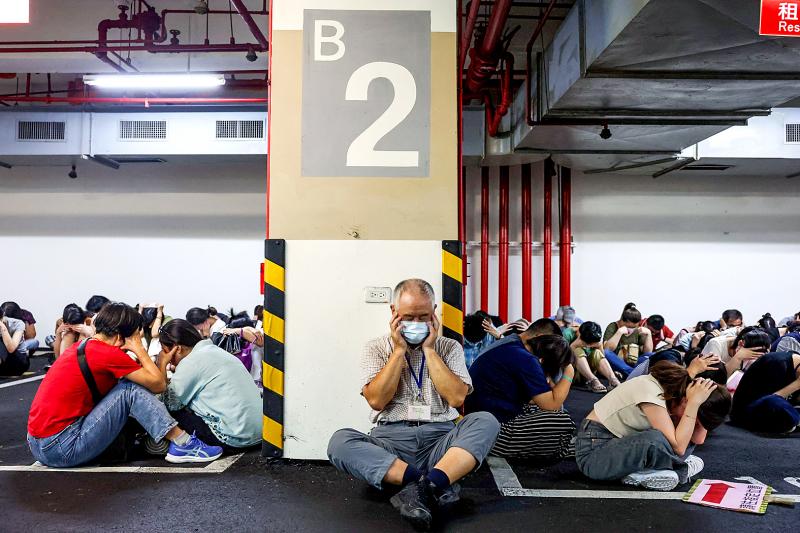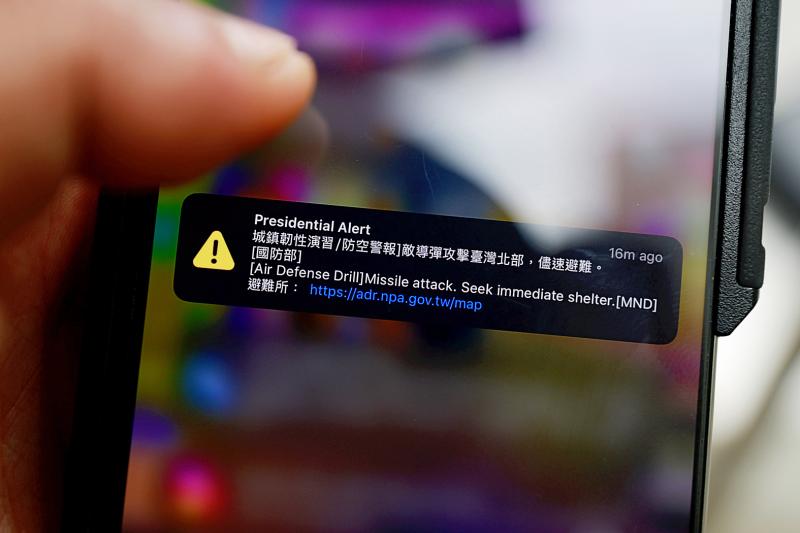Taiwanese armed forces yesterday simulated an enemy advance into the Taipei area after a successful landing, while defending units practiced “hot refueling” helicopters on the ninth day of the Han Kuang exercises.
Most of yesterday’s training units were concentrated in northern Taiwan, with exercises testing combat troops in defending against an invading force while also repairing damaged equipment.
The army’s 601 and 602 Aviation Brigades, in Taichung’s Dongshih District (東勢) and New Taipei City’s Shulin District (樹林) respectively, carried out hot refueling drills.

Photo: Fang Pin-chao, Taipei Times
During the exercises, two UH-60M Black Hawk and two AH-64E Apache helicopters from the 601 Aviation Brigade flew along the Dahan River (大漢溪) before stopping at a riverside park in Shulin.
The drill involved simultaneously refueling and rearming a military aircraft with munitions while its engines were running, allowing the aircraft to quickly return to combat operations, the Ministry of National Defense said.
The practice requires an aircraft to complete hot-pit refueling and rearming within 30 minutes. This morning’s drill was completed in about 20 minutes.

Photo: Liao Yao-tung, Taipei Times
A similar drill was conducted in Taichung, featuring the army’s AH-1W SuperCobra attack helicopters.
Throughout the Han Kuang drills, the armed forces have shown off new equipment such as Hsiung Feng III (雄風三, Brave Wind III) extended-range missiles, US-made FIM-92 Stinger shoulder-fired missiles and a new scouting drone.
Meanwhile, the Matsu Defense Command’s Beigao Garrison Force simulated a scenario involving an attack on the power plant on Beigan Island (北竿), attempting to set ablaze the fuel tanks within.

Photo: AFP
The garrison defended the power plant, which is a primary backup for the power plant in Nangan Township (南竿), against enemy destruction, and aided firefighters and medical services with extinguishing blazes and transporting wounded people.
The exercise demonstrated the adaptability of military and civilian forces in combat situations, the Matsu Defense Command said.
The Republic of China Marine Corps’ 99th Brigade participated in urban warfare simulations, demonstrating the unit’s close-quarters combat capabilities.

Photo: EPA
The mission involved the marines moving from the south to the north of Taiwan proper, demonstrating their ability to operate across theaters.
The Marine Corps’ 66th and 99th brigades also assisted the military police to bolster defenses in Taipei and New Taipei City.
Meanwhile, the most prominent urban resilience drills started yesterday at 1:30pm in northern Taiwan — in Taipei, New Taipei City, Yilan County, Keelung, Taoyuan, and Hsinchu city and county. Similar drills have already been held in other parts of the country.
Air raid alarms and cellphone alerts sounded at 1:30pm, when all vehicles were required to stop and pedestrians ordered to seek shelter and follow directions from officials.
Public transportation continued to operate, but passengers were not allowed to leave stations.
Those who did not comply could face fines of NT$30,000 to NT$150,000.
In New Taipei City, police said that their urban resilience command team went to the Tucheng District (土城) Office, an MRT station and a supermarket to conduct air defense evacuation and shelter drills.
After the alarm, the team went to a water plant in Sansia District (三峽) to simulate disaster relief at critical infrastructure sites.
The region-wide cellphone alerts did not adhere to standard Taiwanese parlance and instead adopted phrasing more commonly used by the Chinese People’s Liberation Army, local media reported.
The rendition of the word “missile strike” in the air raid drill warning was “dao dan” (導彈), instead of the Taiwanese military’s standard usage of “fei dan” (飛彈), per the Ministry of National Defense’s 10th edition of A Simple Dictionary on Rendering English Military Jargon to Chinese (新編國軍簡明美華軍語辭典).
The ministry had not yet addressed the matter as of press time last night.
Additional reporting by CNA, Aaron Tu and Wu Jen-jieh

PREPAREDNESS: Given the difficulty of importing ammunition during wartime, the Ministry of National Defense said it would prioritize ‘coproduction’ partnerships A newly formed unit of the Marine Corps tasked with land-based security operations has recently replaced its aging, domestically produced rifles with more advanced, US-made M4A1 rifles, a source said yesterday. The unnamed source familiar with the matter said the First Security Battalion of the Marine Corps’ Air Defense and Base Guard Group has replaced its older T65K2 rifles, which have been in service since the late 1980s, with the newly received M4A1s. The source did not say exactly when the upgrade took place or how many M4A1s were issued to the battalion. The confirmation came after Chinese-language media reported

A Ministry of Foreign Affairs official yesterday said that a delegation that visited China for an APEC meeting did not receive any kind of treatment that downgraded Taiwan’s sovereignty. Department of International Organizations Director-General Jonathan Sun (孫儉元) said that he and a group of ministry officials visited Shenzhen, China, to attend the APEC Informal Senior Officials’ Meeting last month. The trip went “smoothly and safely” for all Taiwanese delegates, as the Chinese side arranged the trip in accordance with long-standing practices, Sun said at the ministry’s weekly briefing. The Taiwanese group did not encounter any political suppression, he said. Sun made the remarks when

The Taiwanese passport ranked 33rd in a global listing of passports by convenience this month, rising three places from last month’s ranking, but matching its position in January last year. The Henley Passport Index, an international ranking of passports by the number of designations its holder can travel to without a visa, showed that the Taiwan passport enables holders to travel to 139 countries and territories without a visa. Singapore’s passport was ranked the most powerful with visa-free access to 192 destinations out of 227, according to the index published on Tuesday by UK-based migration investment consultancy firm Henley and Partners. Japan’s and

BROAD AGREEMENT: The two are nearing a trade deal to reduce Taiwan’s tariff to 15% and a commitment for TSMC to build five more fabs, a ‘New York Times’ report said Taiwan and the US have reached a broad consensus on a trade deal, the Executive Yuan’s Office of Trade Negotiations said yesterday, after a report said that Washington is set to reduce Taiwan’s tariff rate to 15 percent. The New York Times on Monday reported that the two nations are nearing a trade deal to reduce Taiwan’s tariff rate to 15 percent and commit Taiwan Semiconductor Manufacturing Co (TSMC, 台積電) to building at least five more facilities in the US. “The agreement, which has been under negotiation for months, is being legally scrubbed and could be announced this month,” the paper said,